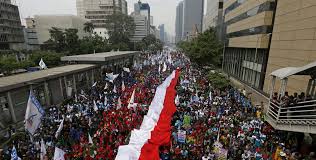According to Japan’s top central banker, there's something changing in the country’s economy.
He is seeing shifts in the country's labor market, and that could augur good things for the Japanese economy, explained Bank of Japan Governor Haruhiko Kuroda while speaking on the sidelines of the 2017 Asian Development Bank meeting in Japan.
He predicted that wages and prices would begin to accelerate.
"[A projected growth rate of] 1.5 percent is not great, but in Japan it is well above medium-term potential growth rate, meaning that the output gap continues to shrink and becoming positive and the labor market continues to tighten so that wages and prices would eventually rise to achieve the 2 percent inflation target around fiscal 2018," Kuroda said.
"The point is that the yield curve control has been functioning quite well and of course if this is around 0 percent 10-year [Japanese Government Bond] target could or should be changed — of course every monetary policy committee meeting, the policy board would discuss and decide whether it should be adjusted upward or downward," he said. "But I feel that since the economy is likely to grow at around 1.5 percent, and wage and prices would start to accelerate in coming months and years, I think we should, for the time being, maintain this around 0 percent operational target."
He expects the annual spring wages negotiations to result in a base pay increase similar to last year's, as for specifics within the labor market, the central banker said. Kuroda explained that the deal-making between businesses and labor tends to "forecast past the 12 month inflation rate, to settle the wage increase or pay rise," while that may not sound like much.
"And in the last 12 months, as I said, inflation rate was down, and basically in negative territory. And yet, they agreed to base pay increase, almost comparable to last year's pay rise," he said. "That means that business and labor have become, to take into account, future inflation rate, in negotiating base pay increase, probably for the first time in the last several decades."
According to Kuroda, part-time workers have seen their pay rising "significantly higher" than regular workers in large companies and small and medium sized enterprises are facing "really tight labor market conditions".
"So all of this makes our contention more reasonable," he said. "In the sense that labor market tightness has been affecting, initially part time workers and irregular workers, but now regular workers in small and medium sized enterprises are experiencing higher pay increases."
Kuroda explained why he thought that was changing even as Japanese corporations have appeared reticent to pay out big raises for many years.
"The Japanese corporate sector now enjoys historic high level of profit, better than ever. — even better than during the bubble period — they have huge profit, huge cash to spend," he said. "So Japanese corporate sector has been increasing capital investment, and now, somewhat belatedly, started to increase wages."
"So I think if we continue our fiscal and monetary policy in coming years, if labor market continues to tighten ... if this situation continues, eventually, tight labor market conditions would force wages to rise significantly," Kuroda added.
Kuroda acknowledged that "headline inflation has been quite slow to adjust upward" in part because of weakness in oil prices even as he said deflation "has gone already" from Japan.
"Japanese people — businesses as well as labor unions — are accustomed to deflationary situation for 15 years," he said.
(Source:www.cnbc.com)
He is seeing shifts in the country's labor market, and that could augur good things for the Japanese economy, explained Bank of Japan Governor Haruhiko Kuroda while speaking on the sidelines of the 2017 Asian Development Bank meeting in Japan.
He predicted that wages and prices would begin to accelerate.
"[A projected growth rate of] 1.5 percent is not great, but in Japan it is well above medium-term potential growth rate, meaning that the output gap continues to shrink and becoming positive and the labor market continues to tighten so that wages and prices would eventually rise to achieve the 2 percent inflation target around fiscal 2018," Kuroda said.
"The point is that the yield curve control has been functioning quite well and of course if this is around 0 percent 10-year [Japanese Government Bond] target could or should be changed — of course every monetary policy committee meeting, the policy board would discuss and decide whether it should be adjusted upward or downward," he said. "But I feel that since the economy is likely to grow at around 1.5 percent, and wage and prices would start to accelerate in coming months and years, I think we should, for the time being, maintain this around 0 percent operational target."
He expects the annual spring wages negotiations to result in a base pay increase similar to last year's, as for specifics within the labor market, the central banker said. Kuroda explained that the deal-making between businesses and labor tends to "forecast past the 12 month inflation rate, to settle the wage increase or pay rise," while that may not sound like much.
"And in the last 12 months, as I said, inflation rate was down, and basically in negative territory. And yet, they agreed to base pay increase, almost comparable to last year's pay rise," he said. "That means that business and labor have become, to take into account, future inflation rate, in negotiating base pay increase, probably for the first time in the last several decades."
According to Kuroda, part-time workers have seen their pay rising "significantly higher" than regular workers in large companies and small and medium sized enterprises are facing "really tight labor market conditions".
"So all of this makes our contention more reasonable," he said. "In the sense that labor market tightness has been affecting, initially part time workers and irregular workers, but now regular workers in small and medium sized enterprises are experiencing higher pay increases."
Kuroda explained why he thought that was changing even as Japanese corporations have appeared reticent to pay out big raises for many years.
"The Japanese corporate sector now enjoys historic high level of profit, better than ever. — even better than during the bubble period — they have huge profit, huge cash to spend," he said. "So Japanese corporate sector has been increasing capital investment, and now, somewhat belatedly, started to increase wages."
"So I think if we continue our fiscal and monetary policy in coming years, if labor market continues to tighten ... if this situation continues, eventually, tight labor market conditions would force wages to rise significantly," Kuroda added.
Kuroda acknowledged that "headline inflation has been quite slow to adjust upward" in part because of weakness in oil prices even as he said deflation "has gone already" from Japan.
"Japanese people — businesses as well as labor unions — are accustomed to deflationary situation for 15 years," he said.
(Source:www.cnbc.com)






